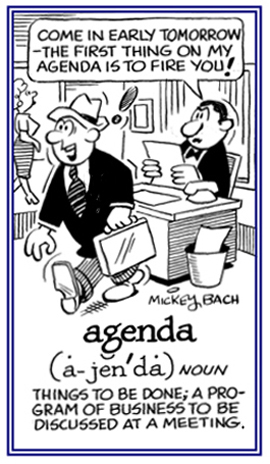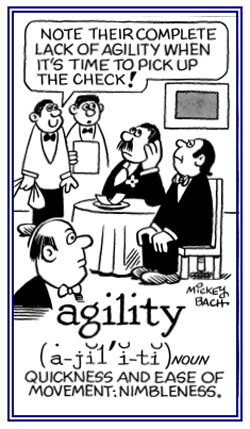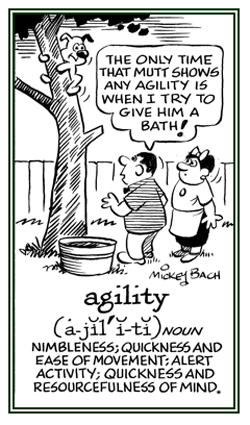ag-, agen-, act-, agi-, agit-
(Latin: to set in motion, to hurry, to shake; to drive; to do, to act; to lead, to conduct, to guide)
2. An administrative division of a government or international organization: One example of such an agency is a United Nations agency.
3. The building or offices where a business negotiates deals for clients is located: The Johnson family was looking for a new home, so they went to the real estateagency in town.
4. The action, medium, or means by which something is accomplished: Sally though that work would be the best agency in order to forget her problems.
5. A legal relationship involving a person, the principal, and someone else who acts for the person, the agent; or the area of the law concerned with such relationships: Ingrid, who could not take care of herself anymore, had been confirmed incompetent and had an agency, or legal representation, to take care of her official letters, banking, etc.
2. An efficient and systematic plan of topics to be taken care of: The secretary kept track of the agendas of the two executives.
The better informed person will use agenda for the plural and agendum for the singular usage.
So well-established is agenda as a singular that "agendas" is now commonly heard and seen as the plural form, however the correct Latin singular is agendum.
The agendum is whether the teaching staff wants an extended school year or not.
The agenda have been established for the next business meeting.


Go to this Word A Day Revisited Index
so you can see more of Mickey Bach's cartoons.
2. Anyone empowered to act for or to represent another person; An agent can be an author's agent or an insurance agent.
3. A means by which something is done or that is caused to be done; an instrument: The building of a daycare center for little children proved to be an agent of definite improvement in the community.
4. A force or substance that causes a change: Examples of an agent can be a chemical agent or an infectious agent.
June put a bleaching agent into the white load of laundry to be washed.
5. A representative or official of a government or administrative department of a government: Jack's uncle was an agent for the FBI.
6. A spy: In the movie, the man with the black coat and hat turned out to be an undercover agent!
7. In linguistics, the noun or noun phrase that specifies the person through whom or the means by which an action is effected: An agent can be the person who does something, like the girl (the agent) started making the cookies for Christmas early in December!
2. The ability to think quickly and intelligently; alert: Even though Ingrid was a centenarian, she still had an agile mind.
2. The ability to think and draw conclusions quickly. such as intellectual acuity: Based on the number of scholarships she won, Harriete's mental agility was remarkable.


Go to this Word A Day Revisited Index
so you can see more of Mickey Bach's cartoons.
2. Anything that causes something to move vigorously or violently: In some countries an earthquake can be the agitant causing the ground to shake and tremble, and houses to tumble down.
2. To excite or to disturb the feeling of: The news on TV agitated Sam so much that he had to phone his neighbot to talk about it.
2. Emotional disturbance or excitement: Lynn was so upset and nervous and worried that she was in a state of agitation and could hardly be understood when she talked.
3. A marked increase in motor activity, generally associated with mental disturbance: There are many causes for agitation, especially including delirium and mania.


